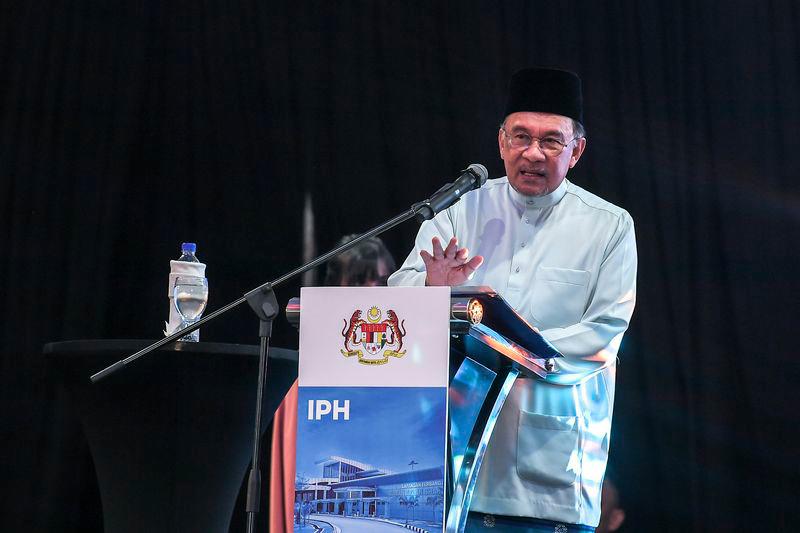IPOH: Malaysia needs to strengthen its alliances, particularly within ASEAN and with other international partners, in order to enhance domestic capacity and build public confidence in the country’s ability to be self-reliant, despite facing tariffs imposed by the United States (US), Prime Minister Datuk Seri Anwar Ibrahim said.
He pointed out that Malaysia’s strength and resilience should be built on the growing networks and relationships between regional countries, Asia, and emerging European markets.
“With the tariff announcement by US President Donald Trump, should we simply complain, or should we be proactive and do something about it?
“The most important thing is to build our domestic capacity and instill confidence among the people that we can stand on our own, that we can grow with our strength, leveraging the expanding networks within ASEAN, Asia, China, India, Australia, Japan, Korea, and by opening new markets in Europe.”
Anwar made these remarks at the launch of the Sultan Azlan Shah Airport upgrading work here today, which was also attended by Transport Minister Anthony Loke, Housing and Local Government Minister Nga Kor Ming, and Perak Menteri Besar Datuk Seri Saarani Mohamad.
The Prime Minister said that those matters were also discussed during consultations and negotiations with ASEAN leaders, as well as during the recent state visit by Chinese President Xi Jinping to Malaysia.
Anwar, who is also Finance Minister, said that several international leaders, including President Mohamed Muizzu of the Maldives, are scheduled to make official visits to Malaysia soon.
As Malaysia is the Chairman of ASEAN for 2025, Anwar said that he has also discussed strategies to expand markets and boost domestic tourism with key figures such as United Nations Secretary-General Antonio Guterres, Brazilian President Luiz Inácio Lula da Silva, and Turkish President Recep Tayyip Erdogan via online meetings.
“One of the key discussions within ASEAN is how we can boost intra-ASEAN tourism. We must compete by improving our facilities, infrastructure, and the efficiency of our officials,” he said.
On April 2, President Trump announced a series of reciprocal tariffs on several countries, including a 24 per cent tariff on imports from Malaysia, which has been postponed for 90 days.
Meanwhile, Anwar said that the government has allocated substantial funding for the transportation sector, including for the construction and upgrading of highways, the East Coast Rail Link (ECRL), and airports, due to their strategic importance to national development and tourism.
“These are not just expenditures, but strategic investments that drive growth and connectivity. With the involvement of private initiatives and companies like Malaysia Airports Holdings Bhd (MAHB), the financial burden on the government can be reduced.
“These improvements were made possible through internally generated funding, reducing the financial strain on the federal government while allowing MAHB greater operational flexibility,” Anwar explained.
On the Sultan Azlan Shah Airport upgrading work, Anwar said it will significantly enhance the facility’s capacity and support a wide range of sectors, including commerce, industry, and tourism.
“In the past, plans to expand and upgrade this airport were stalled due to low demand for flights between Kuala Lumpur and Ipoh. Many people preferred to travel by road.
“However, there are now broader plans to expand regional air connectivity, such as from Senai, Singapore, Kota Kinabalu, and Kuching, which could emerge as distinct aviation hubs in their own right,” he added.
The scope of upgrades at the Sultan Azlan Shah Airport includes expanded terminal space, improved check-in and arrival areas, enhanced immigration facilities, and upgraded security infrastructure such as CCTV systems and scanning machines.









